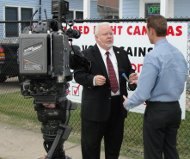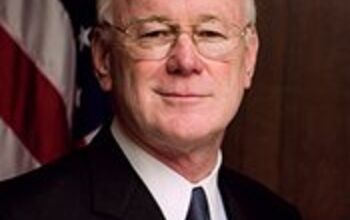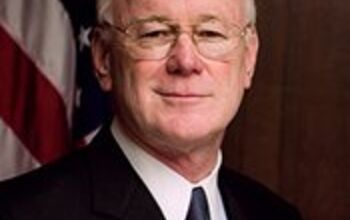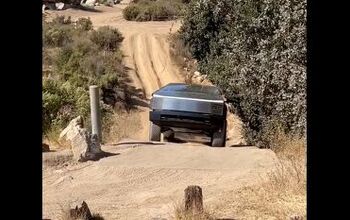Texas: Federal Judge Lets Houston Defend Camera Referendum
A federal judge sided yesterday with a traffic camera company by blocking anti-red light camera referendum sponsors in Houston, Texas from participating in an ongoing legal challenge. US District Court Judge Lynn N. Hughes will decide whether the November 2 vote of Houstonians against traffic cameras should be nullified. Hughes will now make his decision based solely on the arguments presented by supporters of photo enforcement — the city of Houston and American Traffic Solutions (ATS).
Francis and Randy Kubosh had sought to intervene in the case as the main sponsors of the effort to place the charter amendment banning red light cameras on the ballot. The pair argued that they were the only parties capable of providing a real defense to the effort of ATS to undo the election. Both the city of Houston and ATS opposed the participation of Kubosh in the case, preferring instead to settle matters amongst themselves. Hughes saw no problem with this arrangement.
“Having caused the charter’s amendment, the organizers understandably want to defend it,” Hughes wrote. “They need not defend it as long as the city itself will rigorously and thoughtfully work to vindicate it. They question the city’s commitment because of the potential for it to have mixed motivation.”
The Kuboshes have good reason to question the adequacy of Houston’s defense of the choice of the voters. In College Station last year, city attorneys drafted mediocre legal briefs in an obvious attempt to lose the case in court. The Kuboshes provided specific examples of questionable arguments presented by the Houston city attorneys. They also argued that the Texas attorney general should have been notified about the case given the statewide implications of the legal questions involved. Texas law requires that this notification be given by any party suing to invalidate a municipal ordinance, but ATS made no such notice and the city did not object. Texas law also requires one advocate for a contested election to participate in any legal challenge.
“The court must permit at least one intervention on the side of the contestee, if requested to do so, and must permit the intervening contestee to participate fully in the conduct of the contest,” Texas Code 233.004 states.
Hughes ignored this statute, claiming it does not apply to post-election challenges to validity, and insisted that there was nothing wrong with letting the city, which makes $10 million a year from red light camera ticketing, defend the election results.
“The organizers say that the mayor will sell her duty for the revenue the cameras would generate and to avoid paying the city’s commitment under the contract,” Hughes wrote. “Having divergent preferences about policy is not a conflict of interests in the legal sense.”
Kubosh attorney David A. Furlow told TheNewspaper that they intended to appeal the judge’s ruling. Hughes set a December 21 deadline for the responses to the ATS motion to cancel the election results.
A copy of the ruling is available in a 2.6mb PDF file at the source link below.
Opinion on Intervention (US District Court, Southern District Texas, 12/12/2010)
[Courtesy: Thenewspaper.com]
More by The Newspaper
Latest Car Reviews
Read moreLatest Product Reviews
Read moreRecent Comments
- Dwford I don't think price is the real issue. Plenty of people buy $40-50k gas vehicles every year. It's the functionality. People are worried about range and the ability to easily and quickly recharge. Also, if you want to buy an EV these days, you are mostly limited to midsize 5 passenger crossovers. How about some body style variety??
- SCE to AUX The nose went from terrible to weird.
- Chris P Bacon I'm not a fan of either, but if I had to choose, it would be the RAV. It's built for the long run with a NA engine and an 8 speed transmission. The Honda with a turbo and CVT might still last as long, but maintenance is going to cost more to get to 200000 miles for sure. The Honda is built for the first owner to lease and give back in 36 months. The Toyota is built to own and pass down.
- Dwford Ford's management change their plans like they change their underwear. Where were all the prototypes of the larger EVs that were supposed to come out next year? Or for the next gen EV truck? Nowhere to be seen. Now those vaporware models are on the back burner to pursue cheaper models. Yeah, ok.
- Wjtinfwb My comment about "missing the mark" was directed at, of the mentioned cars, none created huge demand or excitement once they were introduced. All three had some cool aspects; Thunderbird was pretty good exterior, let down by the Lincoln LS dash and the fairly weak 3.9L V8 at launch. The Prowler was super cool and unique, only the little nerf bumpers spoiled the exterior and of course the V6 was a huge letdown. SSR had the beans, but in my opinion was spoiled by the tonneau cover over the bed. Remove the cover, finish the bed with some teak or walnut and I think it could have been more appealing. All three were targeting a very small market (expensive 2-seaters without a prestige badge) which probably contributed. The PT Cruiser succeeded in this space by being both more practical and cheap. Of the three, I'd still like to have a Thunderbird in my garage in a classic color like the silver/green metallic offered in the later years.


































Comments
Join the conversation
Judge Hughes sounds like a bailout advocate: this action is not legal but we're going to do it anyway because we know better than the voters.
The amounts involved are far too high to ever believe the camera company or city will do anything to disrupt that revenue stream, even when mandated by state law or local elections. If the Feds won't step in and keep their nose clean, heaven help us.